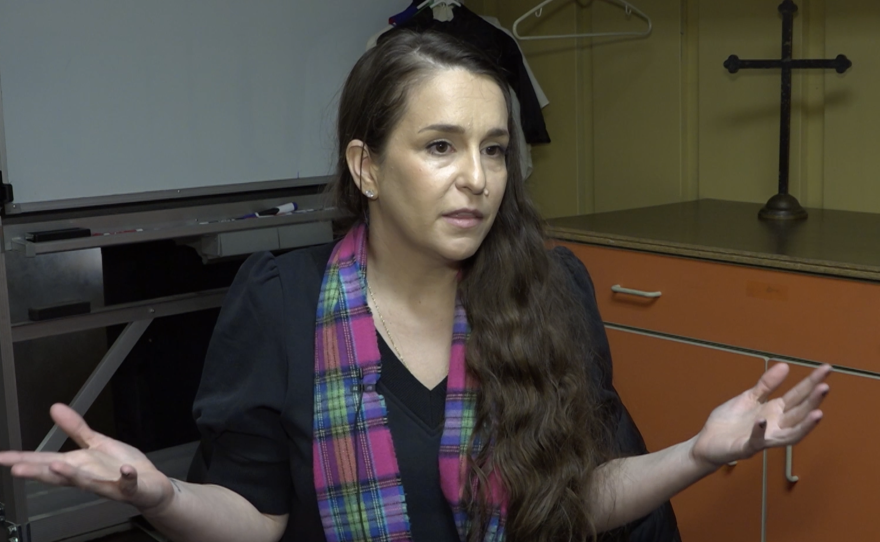Health care is at the epicenter of the federal government shutdown, which is on its way to an end after a deal between majority Republican Senators and a handful of Democrats Sunday night. More than half a million Ohioans rely on subsidies to get health insurance through the Affordable Care Act, and tax credits on those subsidies are expiring as premiums are soaring. And the Republican-backed One Big Beautiful Bill signed this summer made some changes to Medicaid expansion, which covers more than 745,000 Ohioans.
The federal shutdown appears to be coming to an end, but there aren't any agreements on health care costs.
Many Ohioans rely on Medicaid expansion to help with medical costs that they could not otherwise afford. Audrey Anderson is one of them. The 14-year-old Columbus resident has a rare genetic disorder that results in serious intellectual and physical disabilities and requires a lot of specialized care, which her mother Sarah Bloom Anderson said she gets from Medicaid expansion.
“That means Audrey gets to live at home instead of an institution which maybe four decades ago would be what Audrey’s life looks like – not just as a child but as an adult as well," Anderson said.
Stephanie Murray of Columbus also relies on Medicaid expansion for her son, who's battling intractable epilepsy.
“He has full-blown tonic-clonic grand mal seizures, and they average about one a week, and they are pretty awful. And he has a higher chance of what is called SUDEP, which is "sudden unexpected death in epilepsy"," Murray said. "And the more that he has seizures, that kinda raises the percentage and chances of death because of the seizures."
Murray said the medication that helps control her son’s condition costs $40,000 dollars a year.
Murray and Anderson are among the Ohioans who joined a health care roundtable with Democratic former U.S. Sen. Sherrod Brown, who is running to regain a seat in that chamber next year.
Amber Richter of Columbus said the private insurance plan she has doesn’t come close to covering the therapy, surgeries, and medications for her 15-year-old daughter. Just one drug is $4500 a month. Richter said she worries about changes to Medicaid expansion that require families to jump through more hoops in a system she said is already complicated and overwhelming.
"My daughter has a genetic syndrome. She’s going to have it her entire life. So the idea that we would need to prove that, or you know, be recertified annually, I shouldn’t have to prove that she’s still disabled. That’s offensive quite frankly.”
The One Big Beautiful Bill approved by Republican members of Congress and signed by President Trump this summer makes some key changes to Medicaid expansion. For instance, the law said those in the program will also have to prove eligibility every six months, instead of once a year. And it said states must implement work requirements by 2027. Ohio has submitted the paperwork to require Medicaid expansion recipients to work, go to school, or provide care for a family member 80 hours a month. Ohio Medicaid estimates 62,000 Ohioans could be removed from the Medicaid expansion program with work requirements, but the Center for Community Solutions said that number is likely to be much higher, and could go to 450,000 Ohioans.
About 530,000 Ohioans currently rely on federal subsidies to be able to afford health care plans via the Affordable Care Act, also known as Obamacare. Brue Hoyt, a veteran who lives in Columbus, said he relies on that ACA subsidy for health care insurance for his family.
“I’m concerned about losing the subsidy that the Affordable Care Act provides, because I am self-employed and that will double my health insurance costs," Hoyt said, saying it will add about $12,000 a year to his expenses.
Brown said he’s hearing from many Ohioans who fear they or their families will lose health care because of changes in rules or lack of subsidies.
“Republicans are in control: House, Senate, president. They can change. They can fix this immediately," Brown said.
The cost of ACA subsidies has soared over the last decade - from $18 billion in 2014 to an estimated $138 billion this year, according to the Committee for a Responsible Federal Budget. The Congressional Budget Office estimates that extending those subsidies would cost $350 billion over 10 years. Democrats wanted to extend ACA tax credits that were expiring at the end of the year. Republicans did not.
Brown will likely be the Democratic nominee against U.S. Sen. Jon Husted (R-OH) next year. On the floor of the Senate last week, Husted said health care costs are out of control.
“I want to work with anyone in this chamber who will change that, to eliminate the fraud that has filled up this ACA system, to target the benefits to those who truly need them, and to create an insurance market that doesn’t rely on endless taxpayer subsidies," Husted said.
Husted said planned changes for the Medicaid program are meant to reduce waste and fraud.
Though the shutdown might soon be over because of the deal over the weekend, there's no guarantee the subsidies for 93% of those who get health insurance through the ACA will continue. Senate Republicans promised a vote next month, but most in the GOP oppose extending them.







